Vodafone Customer Satisfaction: A Study on International Students
VerifiedAdded on 2023/04/23
|13
|2863
|348
Report
AI Summary
This report investigates the customer satisfaction levels of Vodafone among international students in Australia. It outlines the project's objectives, including understanding customer perception, assessing market potential, and analyzing brand awareness. The scope focuses on the needs and expectations of international students, utilizing methodologies to gauge customer satisfaction. Research questions address service enhancements and strategic plans. The research methodology employs a positivism philosophy and a deductive approach, using a descriptive research design and quantitative data analysis of survey responses from 100 Vodafone customers. The report acknowledges limitations such as potential bias and participation challenges, while adhering to ethical considerations and data protection. A detailed timeline outlines the project's progression from initiation to development and analysis.
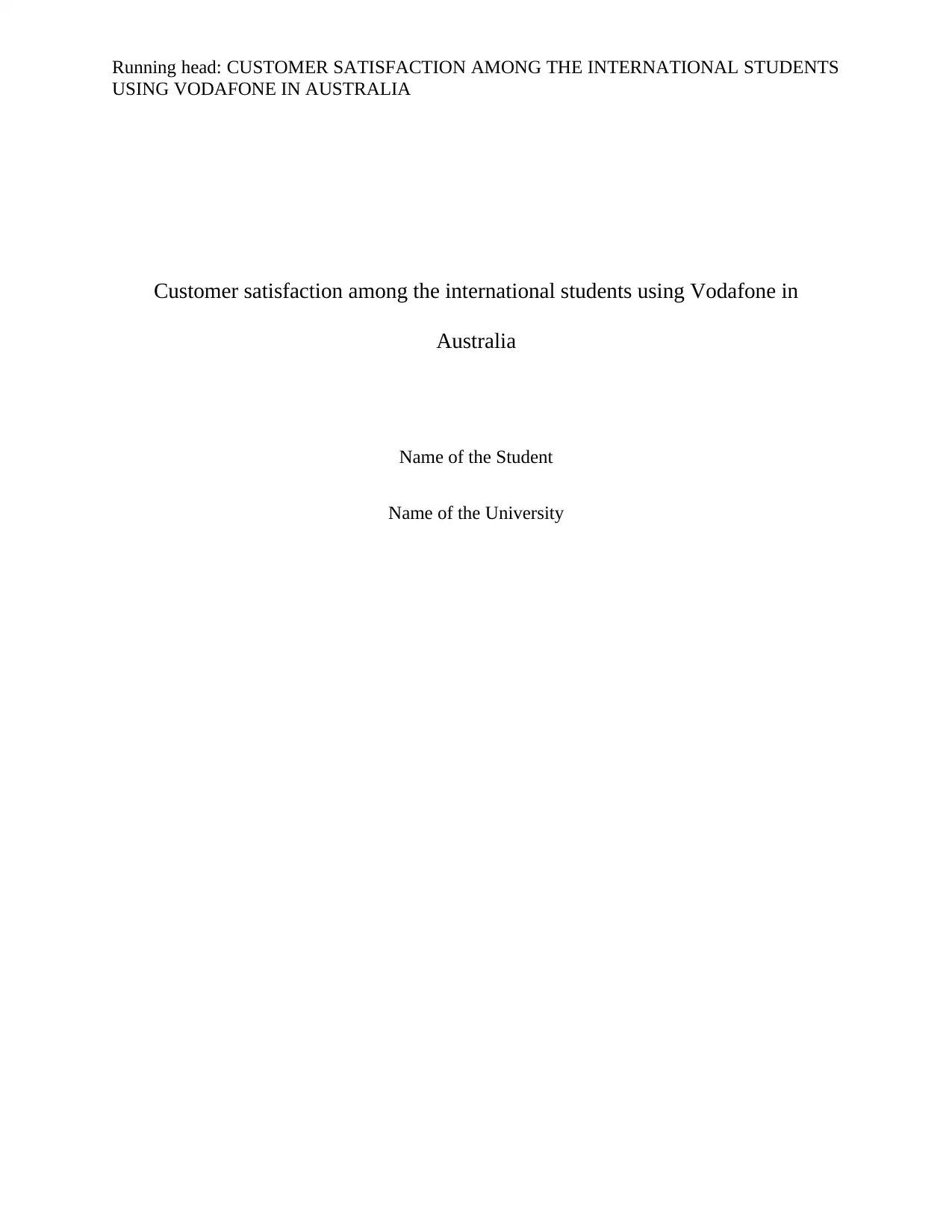
Running head: CUSTOMER SATISFACTION AMONG THE INTERNATIONAL STUDENTS
USING VODAFONE IN AUSTRALIA
Customer satisfaction among the international students using Vodafone in
Australia
Name of the Student
Name of the University
USING VODAFONE IN AUSTRALIA
Customer satisfaction among the international students using Vodafone in
Australia
Name of the Student
Name of the University
Paraphrase This Document
Need a fresh take? Get an instant paraphrase of this document with our AI Paraphraser
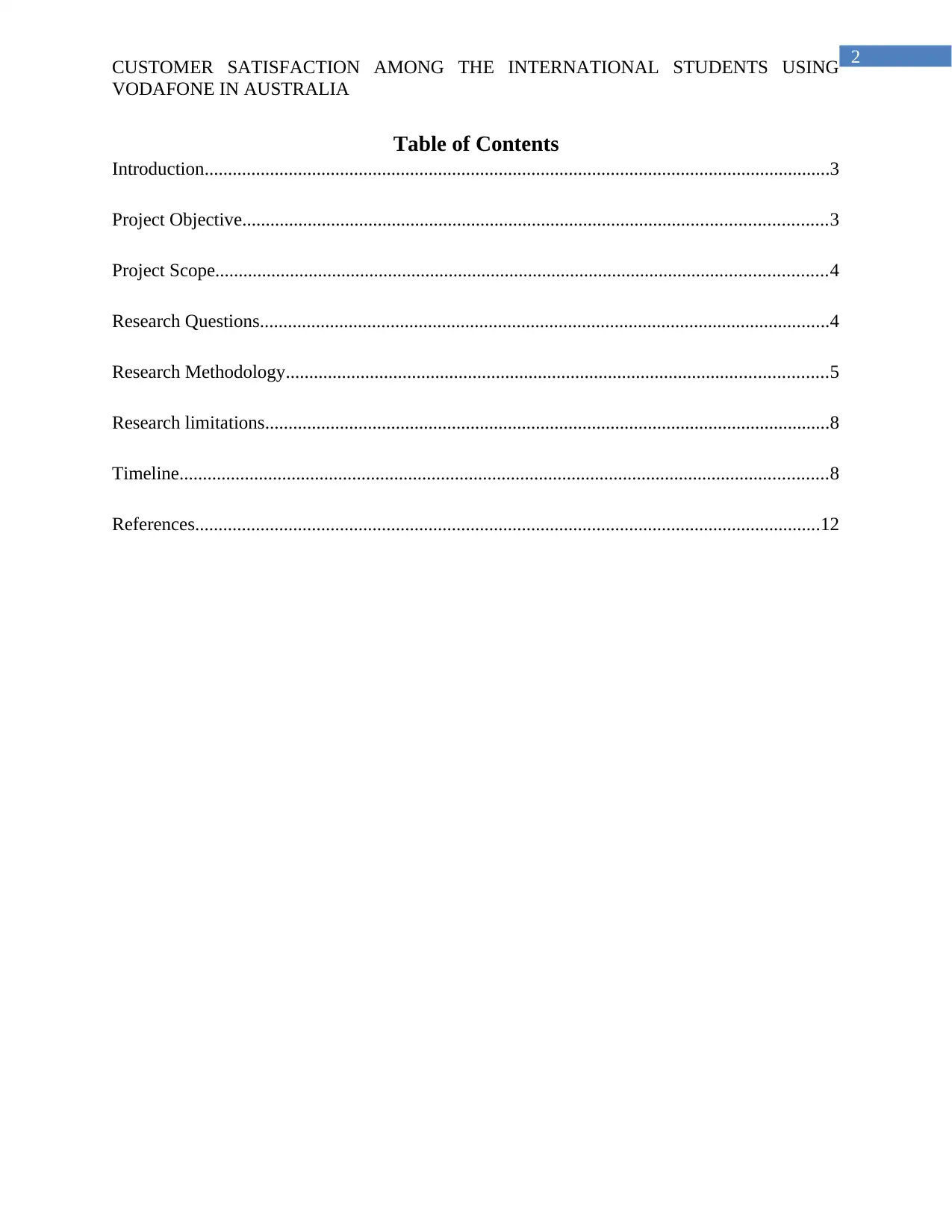
2
CUSTOMER SATISFACTION AMONG THE INTERNATIONAL STUDENTS USING
VODAFONE IN AUSTRALIA
Table of Contents
Introduction......................................................................................................................................3
Project Objective.............................................................................................................................3
Project Scope...................................................................................................................................4
Research Questions..........................................................................................................................4
Research Methodology....................................................................................................................5
Research limitations.........................................................................................................................8
Timeline...........................................................................................................................................8
References......................................................................................................................................12
CUSTOMER SATISFACTION AMONG THE INTERNATIONAL STUDENTS USING
VODAFONE IN AUSTRALIA
Table of Contents
Introduction......................................................................................................................................3
Project Objective.............................................................................................................................3
Project Scope...................................................................................................................................4
Research Questions..........................................................................................................................4
Research Methodology....................................................................................................................5
Research limitations.........................................................................................................................8
Timeline...........................................................................................................................................8
References......................................................................................................................................12
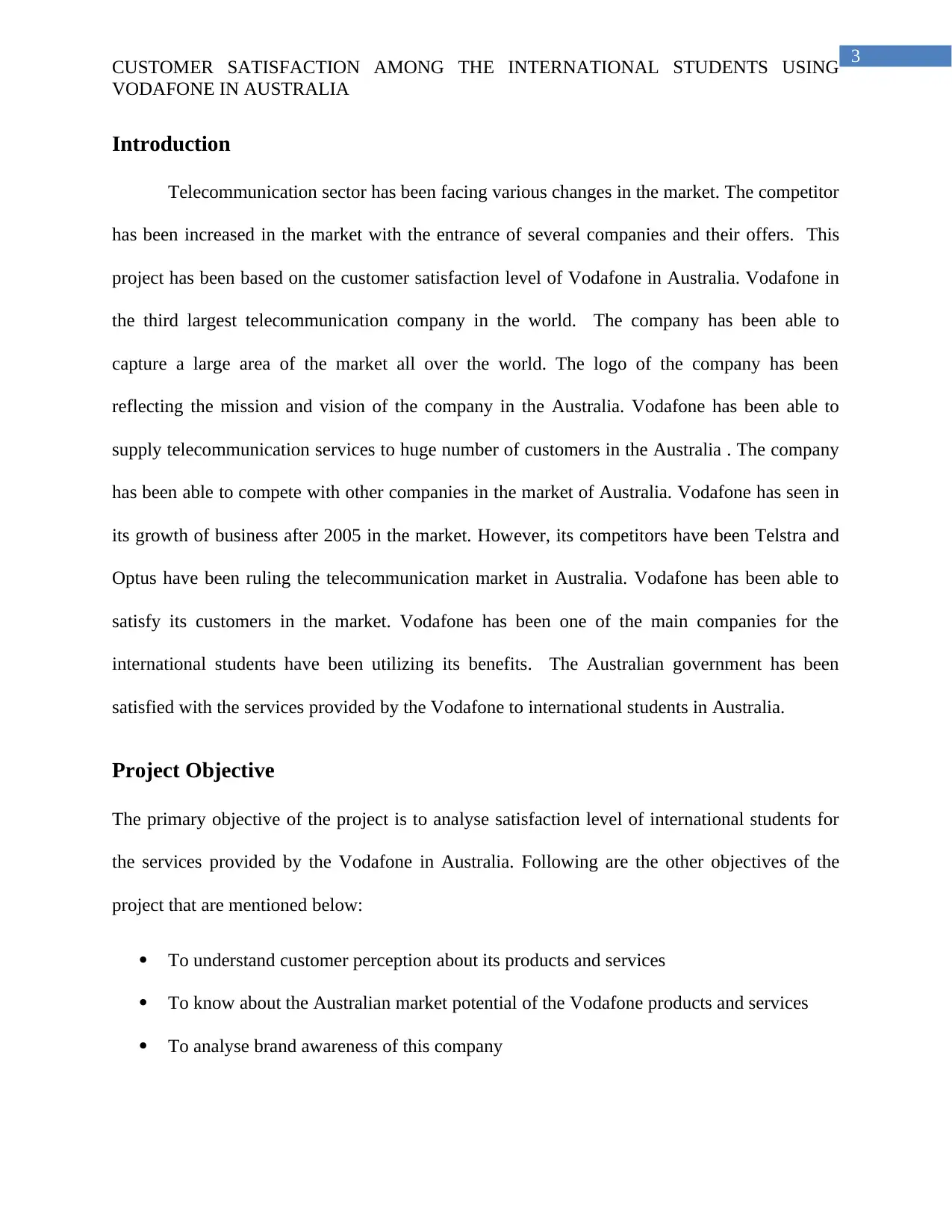
3
CUSTOMER SATISFACTION AMONG THE INTERNATIONAL STUDENTS USING
VODAFONE IN AUSTRALIA
Introduction
Telecommunication sector has been facing various changes in the market. The competitor
has been increased in the market with the entrance of several companies and their offers. This
project has been based on the customer satisfaction level of Vodafone in Australia. Vodafone in
the third largest telecommunication company in the world. The company has been able to
capture a large area of the market all over the world. The logo of the company has been
reflecting the mission and vision of the company in the Australia. Vodafone has been able to
supply telecommunication services to huge number of customers in the Australia . The company
has been able to compete with other companies in the market of Australia. Vodafone has seen in
its growth of business after 2005 in the market. However, its competitors have been Telstra and
Optus have been ruling the telecommunication market in Australia. Vodafone has been able to
satisfy its customers in the market. Vodafone has been one of the main companies for the
international students have been utilizing its benefits. The Australian government has been
satisfied with the services provided by the Vodafone to international students in Australia.
Project Objective
The primary objective of the project is to analyse satisfaction level of international students for
the services provided by the Vodafone in Australia. Following are the other objectives of the
project that are mentioned below:
To understand customer perception about its products and services
To know about the Australian market potential of the Vodafone products and services
To analyse brand awareness of this company
CUSTOMER SATISFACTION AMONG THE INTERNATIONAL STUDENTS USING
VODAFONE IN AUSTRALIA
Introduction
Telecommunication sector has been facing various changes in the market. The competitor
has been increased in the market with the entrance of several companies and their offers. This
project has been based on the customer satisfaction level of Vodafone in Australia. Vodafone in
the third largest telecommunication company in the world. The company has been able to
capture a large area of the market all over the world. The logo of the company has been
reflecting the mission and vision of the company in the Australia. Vodafone has been able to
supply telecommunication services to huge number of customers in the Australia . The company
has been able to compete with other companies in the market of Australia. Vodafone has seen in
its growth of business after 2005 in the market. However, its competitors have been Telstra and
Optus have been ruling the telecommunication market in Australia. Vodafone has been able to
satisfy its customers in the market. Vodafone has been one of the main companies for the
international students have been utilizing its benefits. The Australian government has been
satisfied with the services provided by the Vodafone to international students in Australia.
Project Objective
The primary objective of the project is to analyse satisfaction level of international students for
the services provided by the Vodafone in Australia. Following are the other objectives of the
project that are mentioned below:
To understand customer perception about its products and services
To know about the Australian market potential of the Vodafone products and services
To analyse brand awareness of this company
⊘ This is a preview!⊘
Do you want full access?
Subscribe today to unlock all pages.

Trusted by 1+ million students worldwide
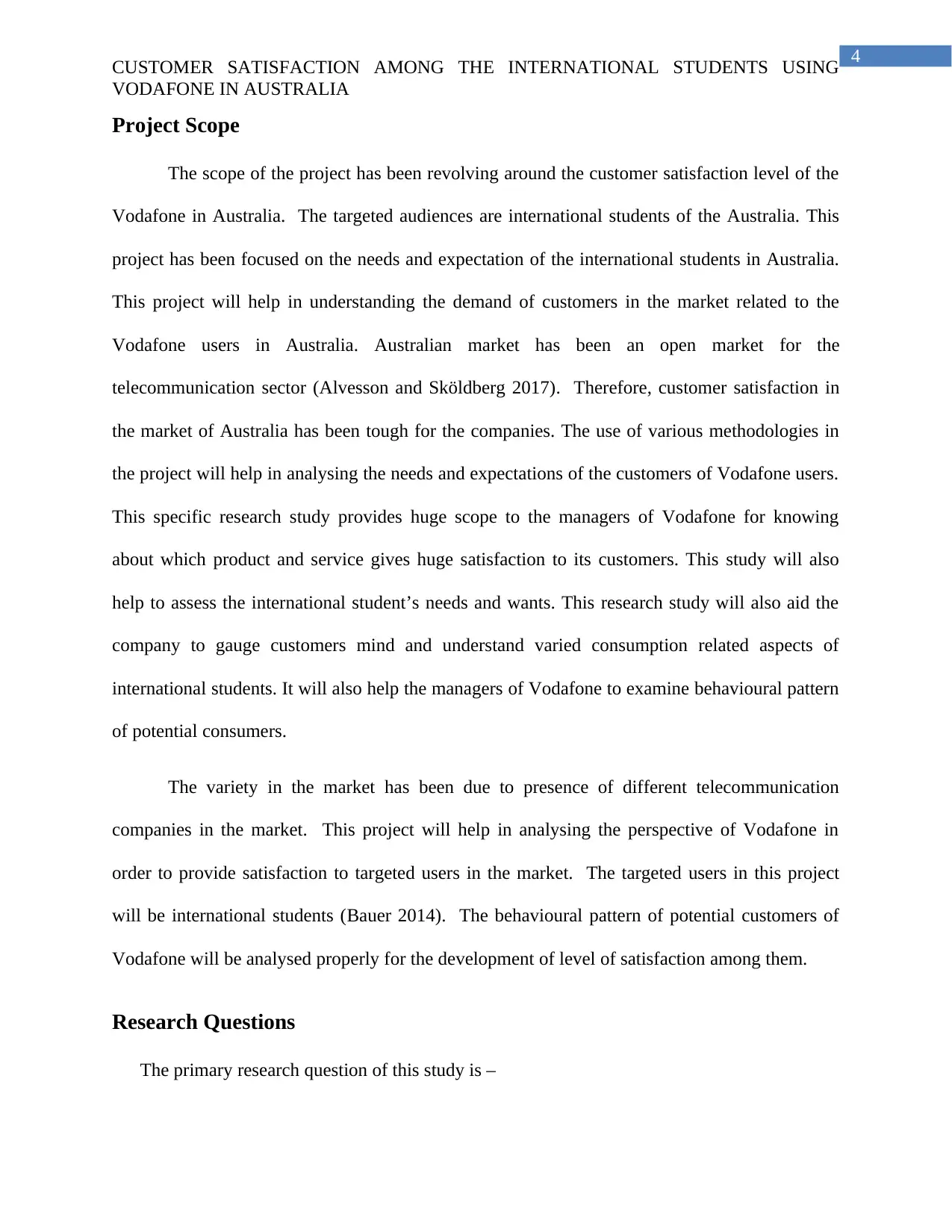
4
CUSTOMER SATISFACTION AMONG THE INTERNATIONAL STUDENTS USING
VODAFONE IN AUSTRALIA
Project Scope
The scope of the project has been revolving around the customer satisfaction level of the
Vodafone in Australia. The targeted audiences are international students of the Australia. This
project has been focused on the needs and expectation of the international students in Australia.
This project will help in understanding the demand of customers in the market related to the
Vodafone users in Australia. Australian market has been an open market for the
telecommunication sector (Alvesson and Sköldberg 2017). Therefore, customer satisfaction in
the market of Australia has been tough for the companies. The use of various methodologies in
the project will help in analysing the needs and expectations of the customers of Vodafone users.
This specific research study provides huge scope to the managers of Vodafone for knowing
about which product and service gives huge satisfaction to its customers. This study will also
help to assess the international student’s needs and wants. This research study will also aid the
company to gauge customers mind and understand varied consumption related aspects of
international students. It will also help the managers of Vodafone to examine behavioural pattern
of potential consumers.
The variety in the market has been due to presence of different telecommunication
companies in the market. This project will help in analysing the perspective of Vodafone in
order to provide satisfaction to targeted users in the market. The targeted users in this project
will be international students (Bauer 2014). The behavioural pattern of potential customers of
Vodafone will be analysed properly for the development of level of satisfaction among them.
Research Questions
The primary research question of this study is –
CUSTOMER SATISFACTION AMONG THE INTERNATIONAL STUDENTS USING
VODAFONE IN AUSTRALIA
Project Scope
The scope of the project has been revolving around the customer satisfaction level of the
Vodafone in Australia. The targeted audiences are international students of the Australia. This
project has been focused on the needs and expectation of the international students in Australia.
This project will help in understanding the demand of customers in the market related to the
Vodafone users in Australia. Australian market has been an open market for the
telecommunication sector (Alvesson and Sköldberg 2017). Therefore, customer satisfaction in
the market of Australia has been tough for the companies. The use of various methodologies in
the project will help in analysing the needs and expectations of the customers of Vodafone users.
This specific research study provides huge scope to the managers of Vodafone for knowing
about which product and service gives huge satisfaction to its customers. This study will also
help to assess the international student’s needs and wants. This research study will also aid the
company to gauge customers mind and understand varied consumption related aspects of
international students. It will also help the managers of Vodafone to examine behavioural pattern
of potential consumers.
The variety in the market has been due to presence of different telecommunication
companies in the market. This project will help in analysing the perspective of Vodafone in
order to provide satisfaction to targeted users in the market. The targeted users in this project
will be international students (Bauer 2014). The behavioural pattern of potential customers of
Vodafone will be analysed properly for the development of level of satisfaction among them.
Research Questions
The primary research question of this study is –
Paraphrase This Document
Need a fresh take? Get an instant paraphrase of this document with our AI Paraphraser
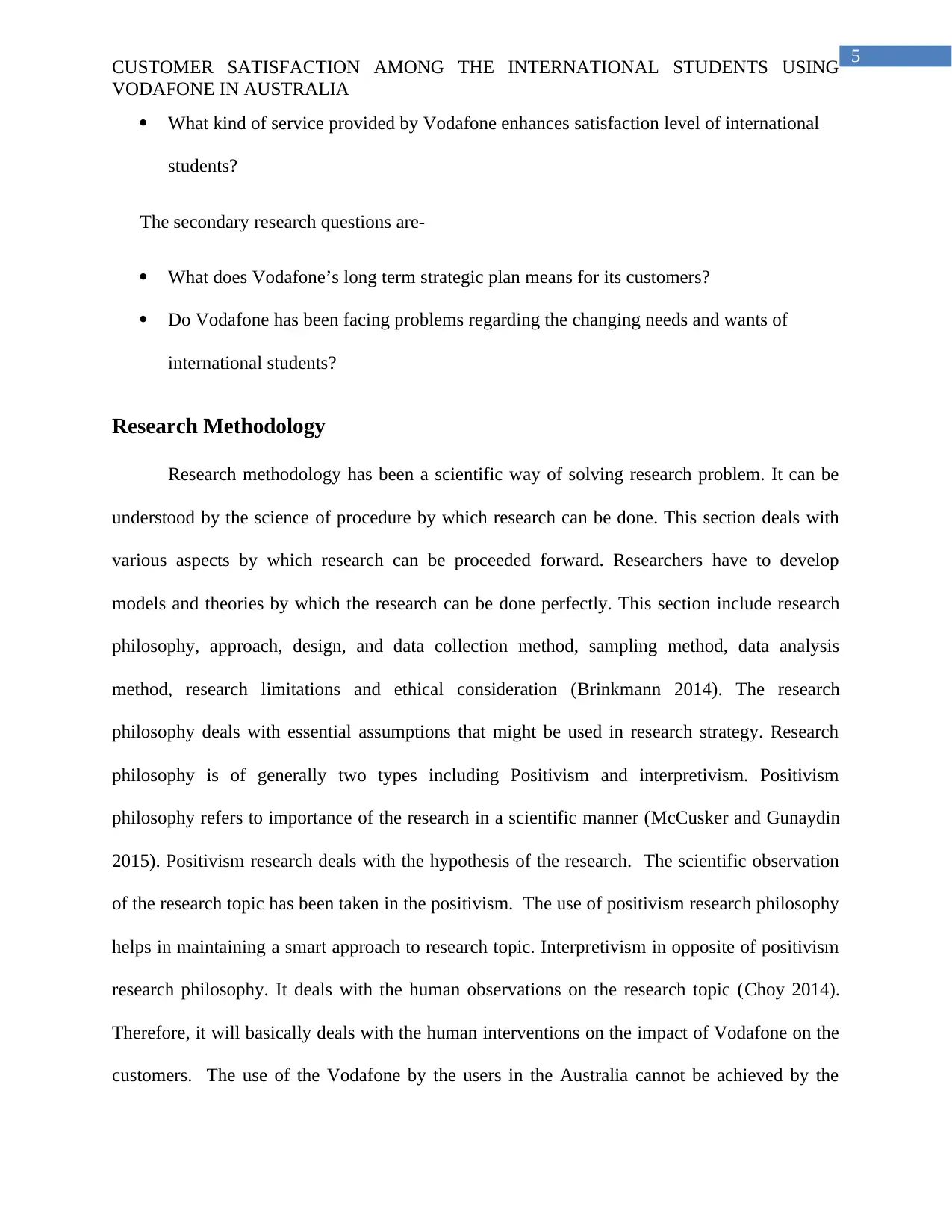
5
CUSTOMER SATISFACTION AMONG THE INTERNATIONAL STUDENTS USING
VODAFONE IN AUSTRALIA
What kind of service provided by Vodafone enhances satisfaction level of international
students?
The secondary research questions are-
What does Vodafone’s long term strategic plan means for its customers?
Do Vodafone has been facing problems regarding the changing needs and wants of
international students?
Research Methodology
Research methodology has been a scientific way of solving research problem. It can be
understood by the science of procedure by which research can be done. This section deals with
various aspects by which research can be proceeded forward. Researchers have to develop
models and theories by which the research can be done perfectly. This section include research
philosophy, approach, design, and data collection method, sampling method, data analysis
method, research limitations and ethical consideration (Brinkmann 2014). The research
philosophy deals with essential assumptions that might be used in research strategy. Research
philosophy is of generally two types including Positivism and interpretivism. Positivism
philosophy refers to importance of the research in a scientific manner (McCusker and Gunaydin
2015). Positivism research deals with the hypothesis of the research. The scientific observation
of the research topic has been taken in the positivism. The use of positivism research philosophy
helps in maintaining a smart approach to research topic. Interpretivism in opposite of positivism
research philosophy. It deals with the human observations on the research topic (Choy 2014).
Therefore, it will basically deals with the human interventions on the impact of Vodafone on the
customers. The use of the Vodafone by the users in the Australia cannot be achieved by the
CUSTOMER SATISFACTION AMONG THE INTERNATIONAL STUDENTS USING
VODAFONE IN AUSTRALIA
What kind of service provided by Vodafone enhances satisfaction level of international
students?
The secondary research questions are-
What does Vodafone’s long term strategic plan means for its customers?
Do Vodafone has been facing problems regarding the changing needs and wants of
international students?
Research Methodology
Research methodology has been a scientific way of solving research problem. It can be
understood by the science of procedure by which research can be done. This section deals with
various aspects by which research can be proceeded forward. Researchers have to develop
models and theories by which the research can be done perfectly. This section include research
philosophy, approach, design, and data collection method, sampling method, data analysis
method, research limitations and ethical consideration (Brinkmann 2014). The research
philosophy deals with essential assumptions that might be used in research strategy. Research
philosophy is of generally two types including Positivism and interpretivism. Positivism
philosophy refers to importance of the research in a scientific manner (McCusker and Gunaydin
2015). Positivism research deals with the hypothesis of the research. The scientific observation
of the research topic has been taken in the positivism. The use of positivism research philosophy
helps in maintaining a smart approach to research topic. Interpretivism in opposite of positivism
research philosophy. It deals with the human observations on the research topic (Choy 2014).
Therefore, it will basically deals with the human interventions on the impact of Vodafone on the
customers. The use of the Vodafone by the users in the Australia cannot be achieved by the
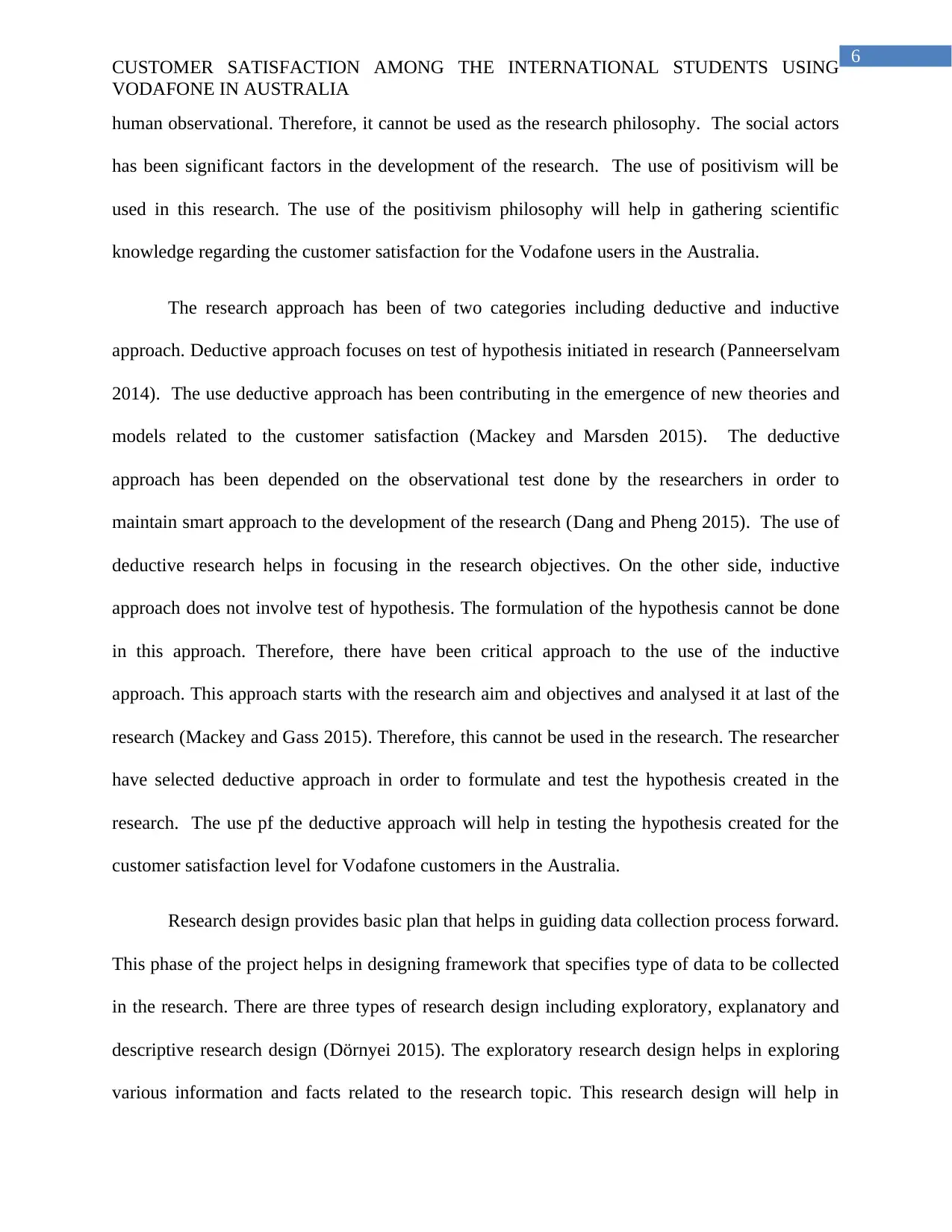
6
CUSTOMER SATISFACTION AMONG THE INTERNATIONAL STUDENTS USING
VODAFONE IN AUSTRALIA
human observational. Therefore, it cannot be used as the research philosophy. The social actors
has been significant factors in the development of the research. The use of positivism will be
used in this research. The use of the positivism philosophy will help in gathering scientific
knowledge regarding the customer satisfaction for the Vodafone users in the Australia.
The research approach has been of two categories including deductive and inductive
approach. Deductive approach focuses on test of hypothesis initiated in research (Panneerselvam
2014). The use deductive approach has been contributing in the emergence of new theories and
models related to the customer satisfaction (Mackey and Marsden 2015). The deductive
approach has been depended on the observational test done by the researchers in order to
maintain smart approach to the development of the research (Dang and Pheng 2015). The use of
deductive research helps in focusing in the research objectives. On the other side, inductive
approach does not involve test of hypothesis. The formulation of the hypothesis cannot be done
in this approach. Therefore, there have been critical approach to the use of the inductive
approach. This approach starts with the research aim and objectives and analysed it at last of the
research (Mackey and Gass 2015). Therefore, this cannot be used in the research. The researcher
have selected deductive approach in order to formulate and test the hypothesis created in the
research. The use pf the deductive approach will help in testing the hypothesis created for the
customer satisfaction level for Vodafone customers in the Australia.
Research design provides basic plan that helps in guiding data collection process forward.
This phase of the project helps in designing framework that specifies type of data to be collected
in the research. There are three types of research design including exploratory, explanatory and
descriptive research design (Dörnyei 2015). The exploratory research design helps in exploring
various information and facts related to the research topic. This research design will help in
CUSTOMER SATISFACTION AMONG THE INTERNATIONAL STUDENTS USING
VODAFONE IN AUSTRALIA
human observational. Therefore, it cannot be used as the research philosophy. The social actors
has been significant factors in the development of the research. The use of positivism will be
used in this research. The use of the positivism philosophy will help in gathering scientific
knowledge regarding the customer satisfaction for the Vodafone users in the Australia.
The research approach has been of two categories including deductive and inductive
approach. Deductive approach focuses on test of hypothesis initiated in research (Panneerselvam
2014). The use deductive approach has been contributing in the emergence of new theories and
models related to the customer satisfaction (Mackey and Marsden 2015). The deductive
approach has been depended on the observational test done by the researchers in order to
maintain smart approach to the development of the research (Dang and Pheng 2015). The use of
deductive research helps in focusing in the research objectives. On the other side, inductive
approach does not involve test of hypothesis. The formulation of the hypothesis cannot be done
in this approach. Therefore, there have been critical approach to the use of the inductive
approach. This approach starts with the research aim and objectives and analysed it at last of the
research (Mackey and Gass 2015). Therefore, this cannot be used in the research. The researcher
have selected deductive approach in order to formulate and test the hypothesis created in the
research. The use pf the deductive approach will help in testing the hypothesis created for the
customer satisfaction level for Vodafone customers in the Australia.
Research design provides basic plan that helps in guiding data collection process forward.
This phase of the project helps in designing framework that specifies type of data to be collected
in the research. There are three types of research design including exploratory, explanatory and
descriptive research design (Dörnyei 2015). The exploratory research design helps in exploring
various information and facts related to the research topic. This research design will help in
⊘ This is a preview!⊘
Do you want full access?
Subscribe today to unlock all pages.

Trusted by 1+ million students worldwide
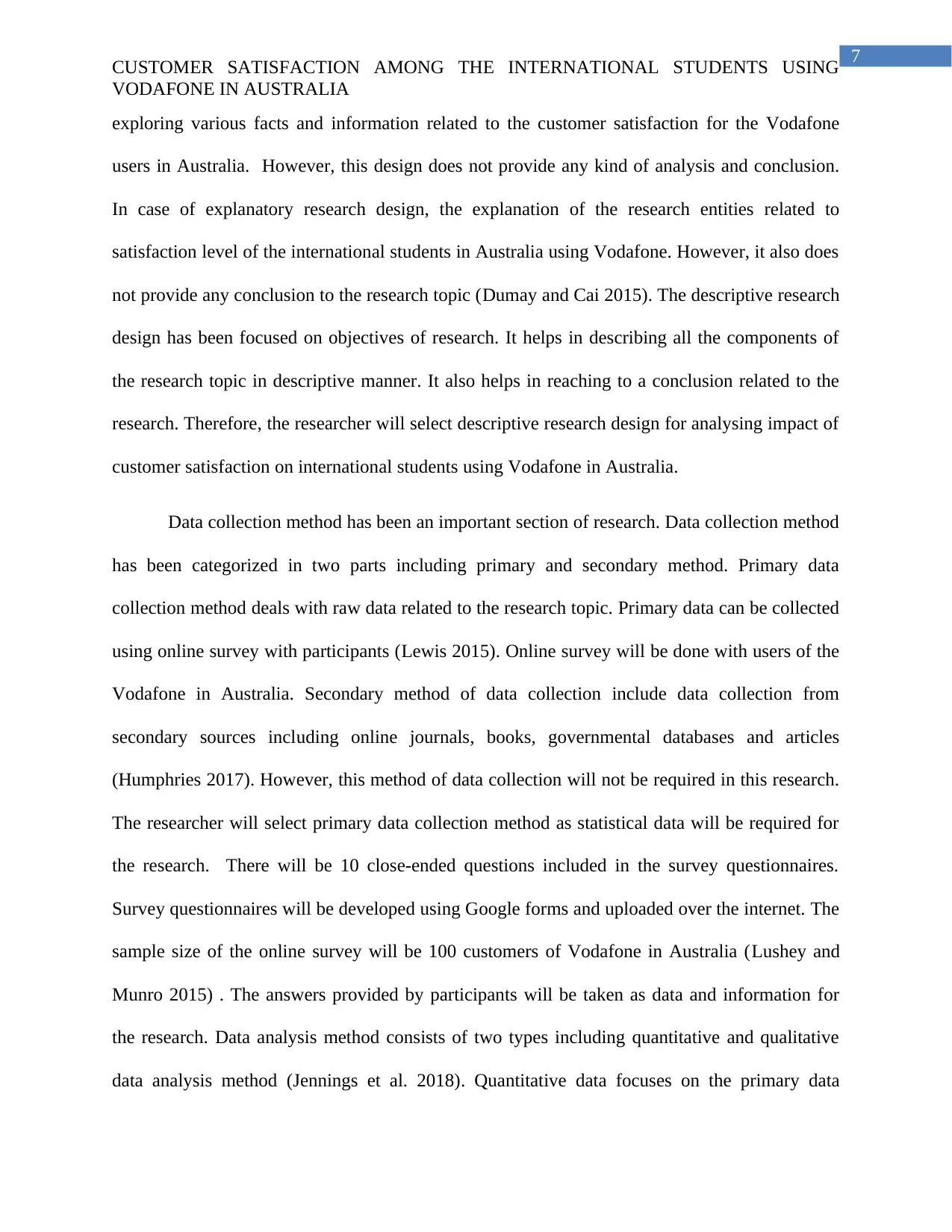
7
CUSTOMER SATISFACTION AMONG THE INTERNATIONAL STUDENTS USING
VODAFONE IN AUSTRALIA
exploring various facts and information related to the customer satisfaction for the Vodafone
users in Australia. However, this design does not provide any kind of analysis and conclusion.
In case of explanatory research design, the explanation of the research entities related to
satisfaction level of the international students in Australia using Vodafone. However, it also does
not provide any conclusion to the research topic (Dumay and Cai 2015). The descriptive research
design has been focused on objectives of research. It helps in describing all the components of
the research topic in descriptive manner. It also helps in reaching to a conclusion related to the
research. Therefore, the researcher will select descriptive research design for analysing impact of
customer satisfaction on international students using Vodafone in Australia.
Data collection method has been an important section of research. Data collection method
has been categorized in two parts including primary and secondary method. Primary data
collection method deals with raw data related to the research topic. Primary data can be collected
using online survey with participants (Lewis 2015). Online survey will be done with users of the
Vodafone in Australia. Secondary method of data collection include data collection from
secondary sources including online journals, books, governmental databases and articles
(Humphries 2017). However, this method of data collection will not be required in this research.
The researcher will select primary data collection method as statistical data will be required for
the research. There will be 10 close-ended questions included in the survey questionnaires.
Survey questionnaires will be developed using Google forms and uploaded over the internet. The
sample size of the online survey will be 100 customers of Vodafone in Australia (Lushey and
Munro 2015) . The answers provided by participants will be taken as data and information for
the research. Data analysis method consists of two types including quantitative and qualitative
data analysis method (Jennings et al. 2018). Quantitative data focuses on the primary data
CUSTOMER SATISFACTION AMONG THE INTERNATIONAL STUDENTS USING
VODAFONE IN AUSTRALIA
exploring various facts and information related to the customer satisfaction for the Vodafone
users in Australia. However, this design does not provide any kind of analysis and conclusion.
In case of explanatory research design, the explanation of the research entities related to
satisfaction level of the international students in Australia using Vodafone. However, it also does
not provide any conclusion to the research topic (Dumay and Cai 2015). The descriptive research
design has been focused on objectives of research. It helps in describing all the components of
the research topic in descriptive manner. It also helps in reaching to a conclusion related to the
research. Therefore, the researcher will select descriptive research design for analysing impact of
customer satisfaction on international students using Vodafone in Australia.
Data collection method has been an important section of research. Data collection method
has been categorized in two parts including primary and secondary method. Primary data
collection method deals with raw data related to the research topic. Primary data can be collected
using online survey with participants (Lewis 2015). Online survey will be done with users of the
Vodafone in Australia. Secondary method of data collection include data collection from
secondary sources including online journals, books, governmental databases and articles
(Humphries 2017). However, this method of data collection will not be required in this research.
The researcher will select primary data collection method as statistical data will be required for
the research. There will be 10 close-ended questions included in the survey questionnaires.
Survey questionnaires will be developed using Google forms and uploaded over the internet. The
sample size of the online survey will be 100 customers of Vodafone in Australia (Lushey and
Munro 2015) . The answers provided by participants will be taken as data and information for
the research. Data analysis method consists of two types including quantitative and qualitative
data analysis method (Jennings et al. 2018). Quantitative data focuses on the primary data
Paraphrase This Document
Need a fresh take? Get an instant paraphrase of this document with our AI Paraphraser
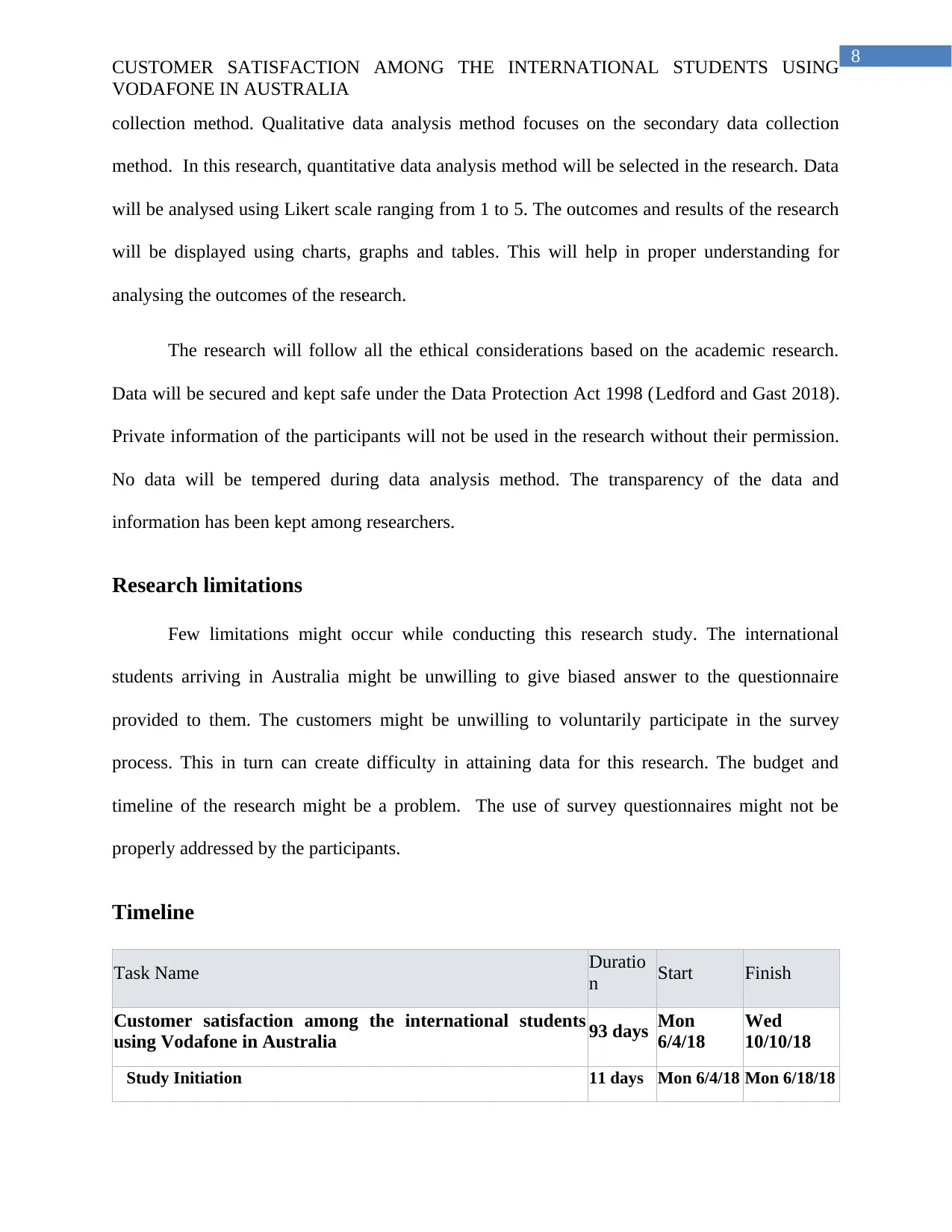
8
CUSTOMER SATISFACTION AMONG THE INTERNATIONAL STUDENTS USING
VODAFONE IN AUSTRALIA
collection method. Qualitative data analysis method focuses on the secondary data collection
method. In this research, quantitative data analysis method will be selected in the research. Data
will be analysed using Likert scale ranging from 1 to 5. The outcomes and results of the research
will be displayed using charts, graphs and tables. This will help in proper understanding for
analysing the outcomes of the research.
The research will follow all the ethical considerations based on the academic research.
Data will be secured and kept safe under the Data Protection Act 1998 (Ledford and Gast 2018).
Private information of the participants will not be used in the research without their permission.
No data will be tempered during data analysis method. The transparency of the data and
information has been kept among researchers.
Research limitations
Few limitations might occur while conducting this research study. The international
students arriving in Australia might be unwilling to give biased answer to the questionnaire
provided to them. The customers might be unwilling to voluntarily participate in the survey
process. This in turn can create difficulty in attaining data for this research. The budget and
timeline of the research might be a problem. The use of survey questionnaires might not be
properly addressed by the participants.
Timeline
Task Name Duratio
n Start Finish
Customer satisfaction among the international students
using Vodafone in Australia 93 days Mon
6/4/18
Wed
10/10/18
Study Initiation 11 days Mon 6/4/18 Mon 6/18/18
CUSTOMER SATISFACTION AMONG THE INTERNATIONAL STUDENTS USING
VODAFONE IN AUSTRALIA
collection method. Qualitative data analysis method focuses on the secondary data collection
method. In this research, quantitative data analysis method will be selected in the research. Data
will be analysed using Likert scale ranging from 1 to 5. The outcomes and results of the research
will be displayed using charts, graphs and tables. This will help in proper understanding for
analysing the outcomes of the research.
The research will follow all the ethical considerations based on the academic research.
Data will be secured and kept safe under the Data Protection Act 1998 (Ledford and Gast 2018).
Private information of the participants will not be used in the research without their permission.
No data will be tempered during data analysis method. The transparency of the data and
information has been kept among researchers.
Research limitations
Few limitations might occur while conducting this research study. The international
students arriving in Australia might be unwilling to give biased answer to the questionnaire
provided to them. The customers might be unwilling to voluntarily participate in the survey
process. This in turn can create difficulty in attaining data for this research. The budget and
timeline of the research might be a problem. The use of survey questionnaires might not be
properly addressed by the participants.
Timeline
Task Name Duratio
n Start Finish
Customer satisfaction among the international students
using Vodafone in Australia 93 days Mon
6/4/18
Wed
10/10/18
Study Initiation 11 days Mon 6/4/18 Mon 6/18/18
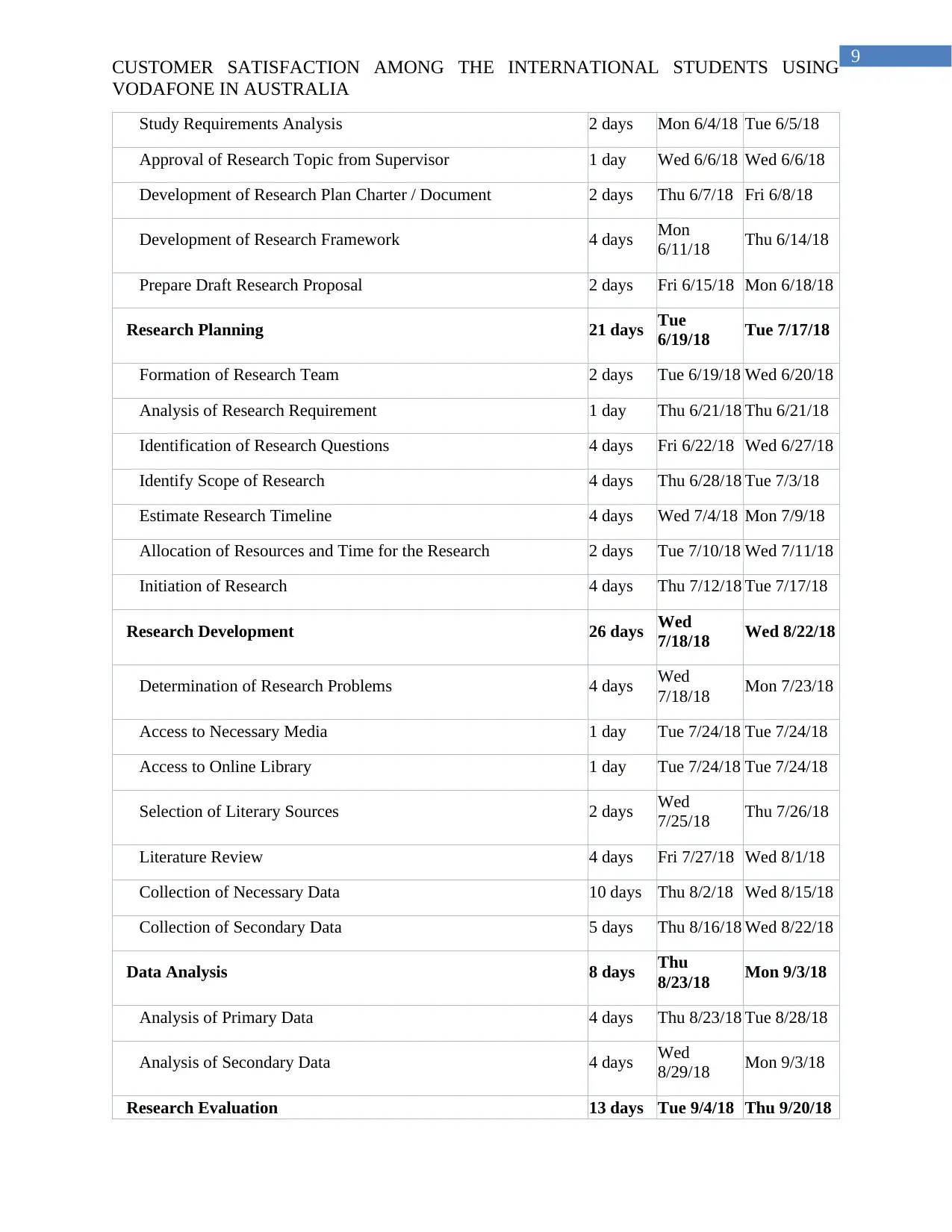
9
CUSTOMER SATISFACTION AMONG THE INTERNATIONAL STUDENTS USING
VODAFONE IN AUSTRALIA
Study Requirements Analysis 2 days Mon 6/4/18 Tue 6/5/18
Approval of Research Topic from Supervisor 1 day Wed 6/6/18 Wed 6/6/18
Development of Research Plan Charter / Document 2 days Thu 6/7/18 Fri 6/8/18
Development of Research Framework 4 days Mon
6/11/18 Thu 6/14/18
Prepare Draft Research Proposal 2 days Fri 6/15/18 Mon 6/18/18
Research Planning 21 days Tue
6/19/18 Tue 7/17/18
Formation of Research Team 2 days Tue 6/19/18 Wed 6/20/18
Analysis of Research Requirement 1 day Thu 6/21/18 Thu 6/21/18
Identification of Research Questions 4 days Fri 6/22/18 Wed 6/27/18
Identify Scope of Research 4 days Thu 6/28/18 Tue 7/3/18
Estimate Research Timeline 4 days Wed 7/4/18 Mon 7/9/18
Allocation of Resources and Time for the Research 2 days Tue 7/10/18 Wed 7/11/18
Initiation of Research 4 days Thu 7/12/18 Tue 7/17/18
Research Development 26 days Wed
7/18/18 Wed 8/22/18
Determination of Research Problems 4 days Wed
7/18/18 Mon 7/23/18
Access to Necessary Media 1 day Tue 7/24/18 Tue 7/24/18
Access to Online Library 1 day Tue 7/24/18 Tue 7/24/18
Selection of Literary Sources 2 days Wed
7/25/18 Thu 7/26/18
Literature Review 4 days Fri 7/27/18 Wed 8/1/18
Collection of Necessary Data 10 days Thu 8/2/18 Wed 8/15/18
Collection of Secondary Data 5 days Thu 8/16/18 Wed 8/22/18
Data Analysis 8 days Thu
8/23/18 Mon 9/3/18
Analysis of Primary Data 4 days Thu 8/23/18 Tue 8/28/18
Analysis of Secondary Data 4 days Wed
8/29/18 Mon 9/3/18
Research Evaluation 13 days Tue 9/4/18 Thu 9/20/18
CUSTOMER SATISFACTION AMONG THE INTERNATIONAL STUDENTS USING
VODAFONE IN AUSTRALIA
Study Requirements Analysis 2 days Mon 6/4/18 Tue 6/5/18
Approval of Research Topic from Supervisor 1 day Wed 6/6/18 Wed 6/6/18
Development of Research Plan Charter / Document 2 days Thu 6/7/18 Fri 6/8/18
Development of Research Framework 4 days Mon
6/11/18 Thu 6/14/18
Prepare Draft Research Proposal 2 days Fri 6/15/18 Mon 6/18/18
Research Planning 21 days Tue
6/19/18 Tue 7/17/18
Formation of Research Team 2 days Tue 6/19/18 Wed 6/20/18
Analysis of Research Requirement 1 day Thu 6/21/18 Thu 6/21/18
Identification of Research Questions 4 days Fri 6/22/18 Wed 6/27/18
Identify Scope of Research 4 days Thu 6/28/18 Tue 7/3/18
Estimate Research Timeline 4 days Wed 7/4/18 Mon 7/9/18
Allocation of Resources and Time for the Research 2 days Tue 7/10/18 Wed 7/11/18
Initiation of Research 4 days Thu 7/12/18 Tue 7/17/18
Research Development 26 days Wed
7/18/18 Wed 8/22/18
Determination of Research Problems 4 days Wed
7/18/18 Mon 7/23/18
Access to Necessary Media 1 day Tue 7/24/18 Tue 7/24/18
Access to Online Library 1 day Tue 7/24/18 Tue 7/24/18
Selection of Literary Sources 2 days Wed
7/25/18 Thu 7/26/18
Literature Review 4 days Fri 7/27/18 Wed 8/1/18
Collection of Necessary Data 10 days Thu 8/2/18 Wed 8/15/18
Collection of Secondary Data 5 days Thu 8/16/18 Wed 8/22/18
Data Analysis 8 days Thu
8/23/18 Mon 9/3/18
Analysis of Primary Data 4 days Thu 8/23/18 Tue 8/28/18
Analysis of Secondary Data 4 days Wed
8/29/18 Mon 9/3/18
Research Evaluation 13 days Tue 9/4/18 Thu 9/20/18
⊘ This is a preview!⊘
Do you want full access?
Subscribe today to unlock all pages.

Trusted by 1+ million students worldwide
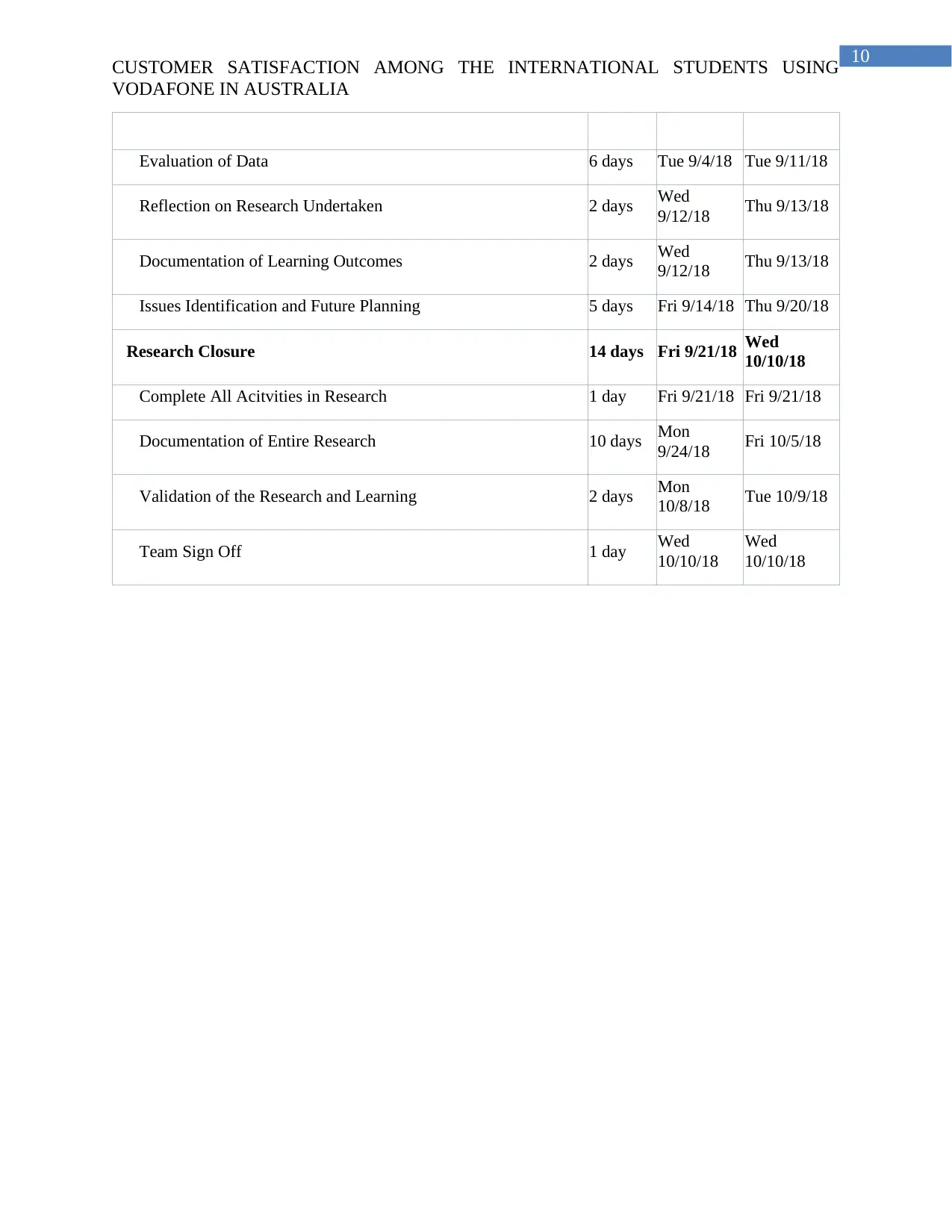
10
CUSTOMER SATISFACTION AMONG THE INTERNATIONAL STUDENTS USING
VODAFONE IN AUSTRALIA
Evaluation of Data 6 days Tue 9/4/18 Tue 9/11/18
Reflection on Research Undertaken 2 days Wed
9/12/18 Thu 9/13/18
Documentation of Learning Outcomes 2 days Wed
9/12/18 Thu 9/13/18
Issues Identification and Future Planning 5 days Fri 9/14/18 Thu 9/20/18
Research Closure 14 days Fri 9/21/18 Wed
10/10/18
Complete All Acitvities in Research 1 day Fri 9/21/18 Fri 9/21/18
Documentation of Entire Research 10 days Mon
9/24/18 Fri 10/5/18
Validation of the Research and Learning 2 days Mon
10/8/18 Tue 10/9/18
Team Sign Off 1 day Wed
10/10/18
Wed
10/10/18
CUSTOMER SATISFACTION AMONG THE INTERNATIONAL STUDENTS USING
VODAFONE IN AUSTRALIA
Evaluation of Data 6 days Tue 9/4/18 Tue 9/11/18
Reflection on Research Undertaken 2 days Wed
9/12/18 Thu 9/13/18
Documentation of Learning Outcomes 2 days Wed
9/12/18 Thu 9/13/18
Issues Identification and Future Planning 5 days Fri 9/14/18 Thu 9/20/18
Research Closure 14 days Fri 9/21/18 Wed
10/10/18
Complete All Acitvities in Research 1 day Fri 9/21/18 Fri 9/21/18
Documentation of Entire Research 10 days Mon
9/24/18 Fri 10/5/18
Validation of the Research and Learning 2 days Mon
10/8/18 Tue 10/9/18
Team Sign Off 1 day Wed
10/10/18
Wed
10/10/18
Paraphrase This Document
Need a fresh take? Get an instant paraphrase of this document with our AI Paraphraser
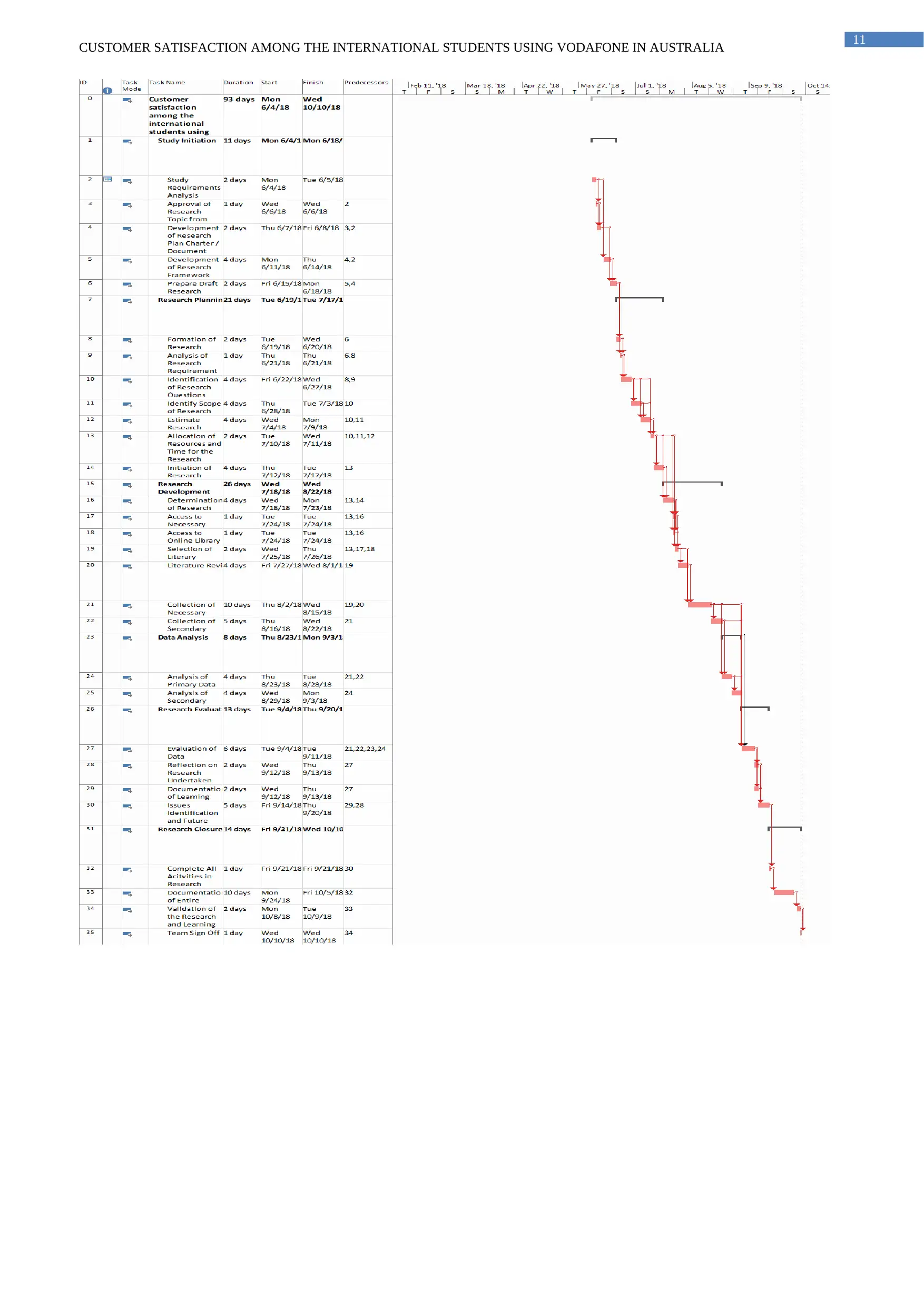
11
CUSTOMER SATISFACTION AMONG THE INTERNATIONAL STUDENTS USING VODAFONE IN AUSTRALIA
CUSTOMER SATISFACTION AMONG THE INTERNATIONAL STUDENTS USING VODAFONE IN AUSTRALIA
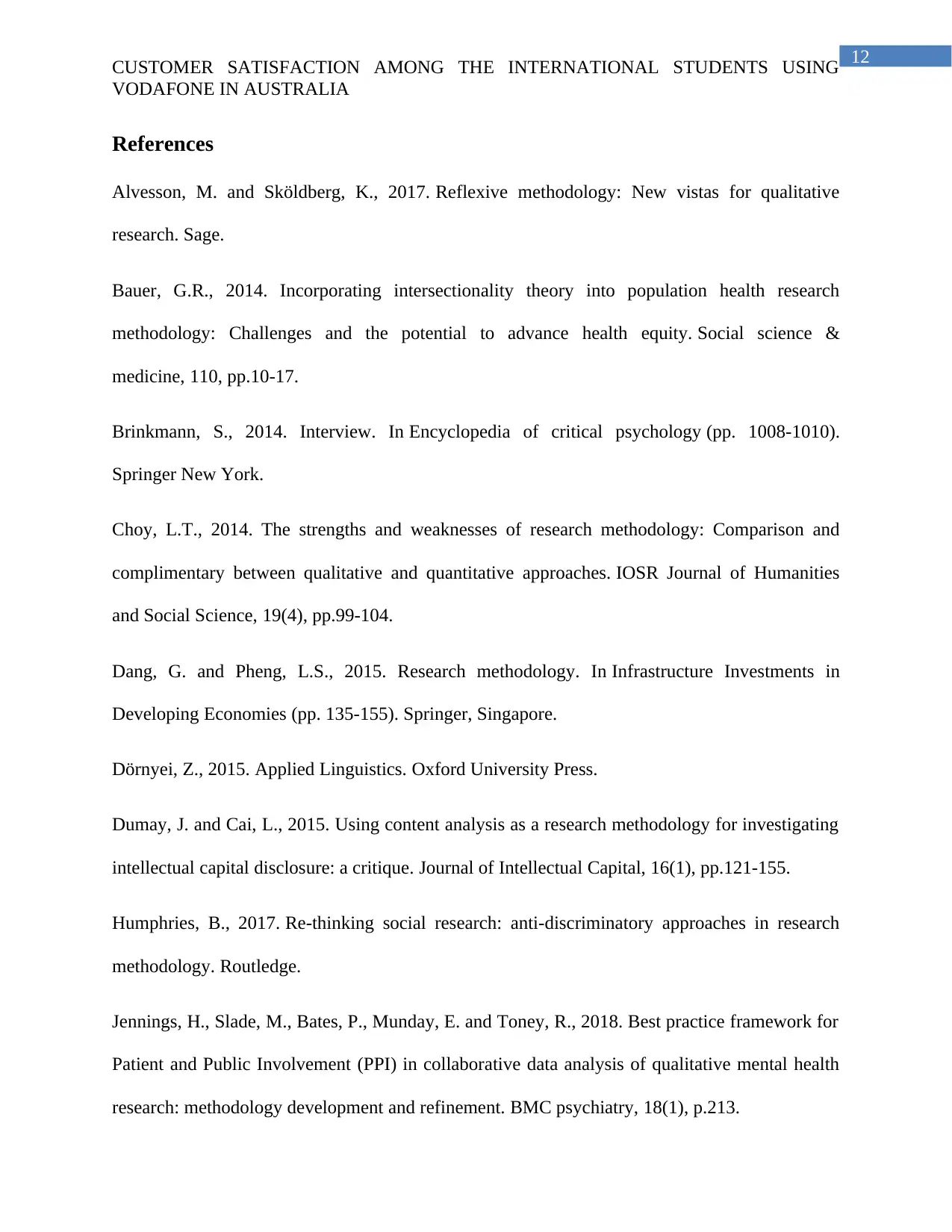
12
CUSTOMER SATISFACTION AMONG THE INTERNATIONAL STUDENTS USING
VODAFONE IN AUSTRALIA
References
Alvesson, M. and Sköldberg, K., 2017. Reflexive methodology: New vistas for qualitative
research. Sage.
Bauer, G.R., 2014. Incorporating intersectionality theory into population health research
methodology: Challenges and the potential to advance health equity. Social science &
medicine, 110, pp.10-17.
Brinkmann, S., 2014. Interview. In Encyclopedia of critical psychology (pp. 1008-1010).
Springer New York.
Choy, L.T., 2014. The strengths and weaknesses of research methodology: Comparison and
complimentary between qualitative and quantitative approaches. IOSR Journal of Humanities
and Social Science, 19(4), pp.99-104.
Dang, G. and Pheng, L.S., 2015. Research methodology. In Infrastructure Investments in
Developing Economies (pp. 135-155). Springer, Singapore.
Dörnyei, Z., 2015. Applied Linguistics. Oxford University Press.
Dumay, J. and Cai, L., 2015. Using content analysis as a research methodology for investigating
intellectual capital disclosure: a critique. Journal of Intellectual Capital, 16(1), pp.121-155.
Humphries, B., 2017. Re-thinking social research: anti-discriminatory approaches in research
methodology. Routledge.
Jennings, H., Slade, M., Bates, P., Munday, E. and Toney, R., 2018. Best practice framework for
Patient and Public Involvement (PPI) in collaborative data analysis of qualitative mental health
research: methodology development and refinement. BMC psychiatry, 18(1), p.213.
CUSTOMER SATISFACTION AMONG THE INTERNATIONAL STUDENTS USING
VODAFONE IN AUSTRALIA
References
Alvesson, M. and Sköldberg, K., 2017. Reflexive methodology: New vistas for qualitative
research. Sage.
Bauer, G.R., 2014. Incorporating intersectionality theory into population health research
methodology: Challenges and the potential to advance health equity. Social science &
medicine, 110, pp.10-17.
Brinkmann, S., 2014. Interview. In Encyclopedia of critical psychology (pp. 1008-1010).
Springer New York.
Choy, L.T., 2014. The strengths and weaknesses of research methodology: Comparison and
complimentary between qualitative and quantitative approaches. IOSR Journal of Humanities
and Social Science, 19(4), pp.99-104.
Dang, G. and Pheng, L.S., 2015. Research methodology. In Infrastructure Investments in
Developing Economies (pp. 135-155). Springer, Singapore.
Dörnyei, Z., 2015. Applied Linguistics. Oxford University Press.
Dumay, J. and Cai, L., 2015. Using content analysis as a research methodology for investigating
intellectual capital disclosure: a critique. Journal of Intellectual Capital, 16(1), pp.121-155.
Humphries, B., 2017. Re-thinking social research: anti-discriminatory approaches in research
methodology. Routledge.
Jennings, H., Slade, M., Bates, P., Munday, E. and Toney, R., 2018. Best practice framework for
Patient and Public Involvement (PPI) in collaborative data analysis of qualitative mental health
research: methodology development and refinement. BMC psychiatry, 18(1), p.213.
⊘ This is a preview!⊘
Do you want full access?
Subscribe today to unlock all pages.

Trusted by 1+ million students worldwide
1 out of 13
Related Documents
Your All-in-One AI-Powered Toolkit for Academic Success.
+13062052269
info@desklib.com
Available 24*7 on WhatsApp / Email
![[object Object]](/_next/static/media/star-bottom.7253800d.svg)
Unlock your academic potential
Copyright © 2020–2025 A2Z Services. All Rights Reserved. Developed and managed by ZUCOL.




